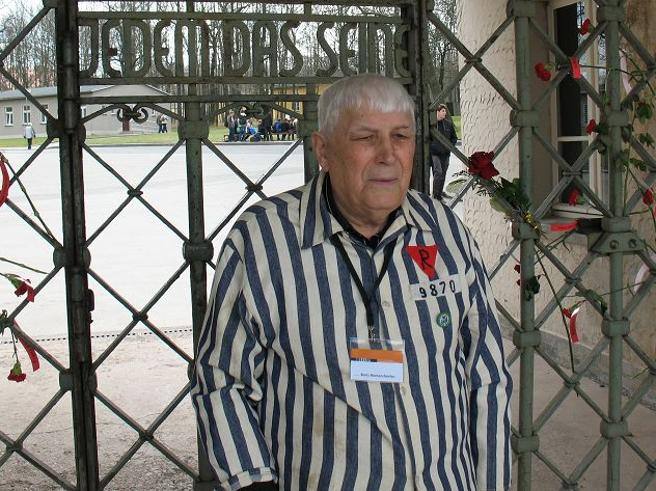by Elvira Serra
He was 96 years old, he had been a political prisoner in Buchenwald and BergenBelsen: burned alive in bed at home. Niece Julia: I couldn’t convince him to go
Boris Romanchenko died on Friday in his bed in Saltivka, a residential area in northeast Kharkiv. A shell hit his apartment, which caught fire. burned alive, his bones are left. His niece Julia would like to give him a proper burial, but he doesn’t have the 25,000 hryvnia (about 770 euros) that private undertakers ask of him. The community has said that they will take care of it, but Yulia will have to wait a few more months: now there is a war.
The war was already here when Boris was a boy, he was sixteen and was deported to Dortmund for forced labour: he needed work and he was a young and strong Soviet communist, in fact in his uniform he wore the red triangle that identified him as prisoner policy. He tried to escape but was captured and transferred to the Buchenwald concentration camp. He was also held prisoner in Peenemnde, MittelbauDora and BergenBelsen and forced to build the Nazi Army’s V2 rockets. Before returning to Ukraine, he had to serve for many years in the Soviet army stationed in East Germany.
The war news in real time
We know these things because he remembered them the Foundation for the Remembrance of the Buchenwald and MittelbauDora Concentration Camps
to announce his death. He posted two photos of Boris on his social media profiles: one in the infamous striped pajamas, at the entrance to the Buchenwald camp; the other, on taking his oath on the 70th anniversary of the camp’s liberation, saying in Russian: Building a new world of peace and freedom is our ideal. In this sense he was VicePresident for Ukraine of the International Committee Buchenwald Dora and Commandos.
He was born on January 20, 1926 in Bondari near Sumy, less than two hundred kilometers north of Kharkiv. He often told me about the war he escaped. He kept a diary, who knows if we’ll find it again, his granddaughter Julia explained to the Ukrainian press, recalling the human depth of this grandfather, who had witnessed the horrors of Hitler. It was he who taught her to read and write. He taught me everything, I always went to see him during the holidays. He had lived alone in this building for thirty years. I tried to get him to leave but he wouldn’t. He was now deaf and had trouble walking.
He had not forgotten his war. always talks Yulia: in those years he happened to dream even a crumb of bread. Three years ago in the city of Weimar, eight kilometers from the Buchenwald concentration camp, the good face of Boris Romanchenko was part of the portrait exhibition by the artist Thomas Müller Die Zeitzeugen, photos in giant format scattered in the street from the train station to the Bauhaus Museum. Andriy Yermak, the head of President Volodymyr Zelenskyy’s office, commented on Telegram on Boris’ death: This is what they call the “denazification operation”.
March 21, 2022 (change March 21, 2022 | 21:39)
© REPRODUCTION RESERVED

